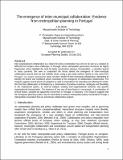| dc.contributor.author | Rayle, Lisa | |
| dc.contributor.author | Zegras, P. Christopher | |
| dc.date.accessioned | 2016-01-12T14:11:57Z | |
| dc.date.available | 2016-01-12T14:11:57Z | |
| dc.date.issued | 2012-09 | |
| dc.date.submitted | 2011-03 | |
| dc.identifier.issn | 0965-4313 | |
| dc.identifier.issn | 1469-5944 | |
| dc.identifier.uri | http://hdl.handle.net/1721.1/100799 | |
| dc.description.abstract | Inter-organizational collaboration as a means for policy coordination has come to be seen as a solution to difficult and complex urban challenges. In Portugal, where metropolitan governance structures are highly fragmented, critics highlight the need for better coordination between municipalities—a situation typical in many countries. We seek to understand the forces behind the emergence of inter-municipal collaboration around land use and mobility issues, using a case study method. Based on nine cases from Portugal's two largest metropolitan areas, we test a model of inter-municipal collaboration, attempting to identify the factors and conditions which contribute to the emergence of collaborative relationships. The analysis suggests several points of validation as well as propositions for extending and refining the model. We find that collaboration is facilitated by a combination of positive incentives, ambiguity and flexibility in the institutional system, an external catalyst, existing inter-organizational networks, and specific organizational characteristics. The existence of any one of these factors is not enough. A combination of several factors, possible but apparently uncommon in Portugal, is necessary. This research suggests that the Portuguese planning system may be most likely to achieve metropolitan policy coordination through a metropolitan association that can incentivize collaborative projects. | en_US |
| dc.description.sponsorship | Portuguese Foundation for International Cooperation in Science, Technology and Higher Education (MIT-Portugal Program) | en_US |
| dc.language.iso | en_US | |
| dc.publisher | Taylor & Francis | en_US |
| dc.relation.isversionof | http://dx.doi.org/10.1080/09654313.2012.722932 | en_US |
| dc.rights | Creative Commons Attribution-Noncommercial-Share Alike | en_US |
| dc.rights.uri | http://creativecommons.org/licenses/by-nc-sa/4.0/ | en_US |
| dc.source | Prof. Zegras via Peter Cohn | en_US |
| dc.title | The Emergence of Inter-Municipal Collaboration: Evidence from Metropolitan Planning in Portugal | en_US |
| dc.type | Article | en_US |
| dc.identifier.citation | Rayle, Lisa, and Christopher Zegras. “The Emergence of Inter-Municipal Collaboration: Evidence from Metropolitan Planning in Portugal.” European Planning Studies 21, no. 6 (June 2013): 867–889. | en_US |
| dc.contributor.department | Massachusetts Institute of Technology. Department of Urban Studies and Planning | en_US |
| dc.contributor.approver | Zegras, P. Christopher | en_US |
| dc.contributor.mitauthor | Zegras, P. Christopher | en_US |
| dc.contributor.mitauthor | Rayle, Lisa | en_US |
| dc.relation.journal | European Planning Studies | en_US |
| dc.eprint.version | Author's final manuscript | en_US |
| dc.type.uri | http://purl.org/eprint/type/JournalArticle | en_US |
| eprint.status | http://purl.org/eprint/status/PeerReviewed | en_US |
| dspace.orderedauthors | Rayle, Lisa; Zegras, Christopher | en_US |
| mit.license | OPEN_ACCESS_POLICY | en_US |
| mit.metadata.status | Complete | |
